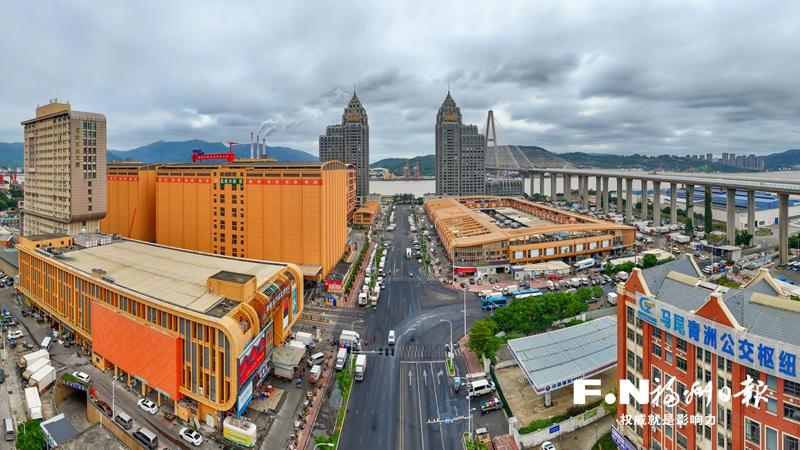Mawei Achieves Global Trade of Aquatic Products, with Promising Future Prospects for Companies
Mawei Achieves Global Trade of Aquatic Products, with Promising Future Prospects for Companies–
“Fuzhou has the potential to become a Yiwu of the aquatic products sector”

Mingcheng Strait Aquatic Product Trade Center in Mawei District. (PhotobyReporter Yuan Hao)
The Mingcheng Strait Aquatic ProductTradeCenter in Mawei District offers a diverse selection of aquatic products from across the world, including cod fish heads from France, cod from Australia, ribbonfish from Iran, black scraper and bigeye from Indonesia, as well as premium shrimp from Ecuador. As one of the largest aquatic product trading markets in China and a key hub for deep-sea fisheries, it plays a pivotal role in the global trade of aquatic products.Mawei, abundant in river and sea resources, is leveraging its strength in aquatic product aggregation to vigorously develop the ocean economy, aiming to create a distinctive local industry cluster for pre-made food of aquatic products.
Building a “Yiwu” of the aquatic products sector
On the morning of the 3rd, the reporter visited the Cold Storage Area B at the Mingcheng Strait Aquatic Product Trade Center,where refrigerated trucks came and went in a continuous flow, forklift drivers were busy at work, and workers were loading and unloading goods onthe cold storage platform.
In 2023, the Mingcheng Strait Aquatic Product Trade Center was ranked among China’s Top 100 Comprehensive Commodity Markets, making it the only one in the city and one of just two in the province to receive this recognition. The market gathers seafood from nearby fishing ports and around the world, which is then distributed across the country via refrigerated trucks.The related person in charge at the Mawei District Administration for Market Regulation said,“Mawei hosts half of the live seafood transport vehicles in China, attracting wholesalers from across the country for centralized, one-stop procurement.”
“With Mawei’s strength in aquatic product aggregation, Fuzhou is well-positioned to become the ‘Yiwu’ of the aquatic products sector,”said Lin Xiangming, President of Mingcheng Group. The Mingcheng Strait Aquatic Product Trade Center features a 350,000-square-meter large-scale spot wholesale market, a 150,000-ton high-standard cold storage facility, and a 3,000-ton dedicated fishing pier. With over 1,000 domestic and international merchants,the center operates across China, as well as countries inASEAN, Australia, the United States, and West Africa. Last year, the market’s total businessvolume reached 12 billion yuan, with a trading volume of 1.1 million tons.
A hub for a quarter of China’s deep-sea fishingcatches
It may be hard to imagine that Mawei, despite its limited seafood production, has become a major hub for aquatic products. In fact, about a quarter of China’s deep-sea fishing catches are distributed nationwide from Mawei.
“Mawei’s deep-sea fishing vessels are active in oceans worldwide. In Africa’s waters, Mawei people have set up China’s largest overseas fishing base, while in the Indian Ocean, Mawei fishermen operate ships focused on tuna fishing…”said Zhuo Xinrong, Chairman of Fuzhou Honglong Marine Seafood Co., Ltd.For example, Honglong owns 58 fishing and transport vessels, with the main catches including sharks, squid, cuttlefish, mackerel, and sardines.
In recent years, the company has set up overseas bases such as the penaeus vannamei breeding base. Last year, the total catch amounted to 62,000 tons, with 60,000 tons brought back.
Mawei is not only a hub for active aquatic product trade but also leads the province in cold storage capacity and cold chain logistics. The district has developed a cold storage capacity of 2.54 million cubic meters. Additionally, Mawei was selected as one of the first national key cold chain logistics bases in China.
Focusing on the development ofpre-made food of aquatic products
“We strive to make Mawei aglobal hub for aquatic products,”said the head of the Mawei District Committee.Leveraging its strength in aquatic product aggregation, Mawei is driving the strengthening, extension, and supplementation of the marine industry chain while promoting the coordinated development of the primary, secondary, and tertiary industries. It aims to build a complete industry chain that includes deep-sea fishing, cold chain, advanced processing, and trade logistics, striving to achieve “making the most of a fish” and “creating a banquet,” while developing a distinctive industry cluster for pre-made food of aquatic products with Mawei characteristics.
As of now, Mawei has nurtured a number of leading pre-made foodcompaniesin the aquatic products sector, such as Mandy Foods, Hydewin, Kunxing, Baixian, and Minyang, and has developed standout products like “Fotiaoqiang”as industry champions.
In the south of the Mingcheng Strait Aquatic Product Trade Center,more than 300 product varieties across five major categories, including octopus, abalone, red snapper, and eel, are continuously rolling off the production line.“Our octopus series leads the aquatic product industry in China, accounting for 53% of China's exports to the Japanese market. Our abalone sushi series holds 51% of the market share for China's exports to Japan,” said the head of Mandy Foods.Through deep processing, the aquatic products not only increase in value but also offer convenience to consumers, who can enjoy them immediately after thawing.
At the Tingjiang Chang’an Industrial Park, Zhengfu Cold Chain has established the largest ultra-low-temperature cold storage in the province and the second-largest in China.Xiao Rong, Chairman of Zhengfu Cold Chain, along with his team, developed patented technologies like the "ultra-low-temperature air cooler closed defrosting system," which have lowered cold storage energy consumption by 20%, while ensuring optimal preservation of taste and nutrition in premium seafood.In the nearby Hydewin Industrial Park, abalone, sea cucumber, scallops, and various other seafood are processed through digital steps such as sorting and cooking, transforming into ready-to-eat Fotiaoqiang that smellsdelicious.These dishes are then frozen, packaged, and distributed both locally and internationally. “Consumers can enjoy the ready-to-eat Fotiaoqiangwith just a quick reheat,” said Ou Yubin, Chairman of Hydewin. (Fuzhou Daily Reporter:Ouyang Jinquan)